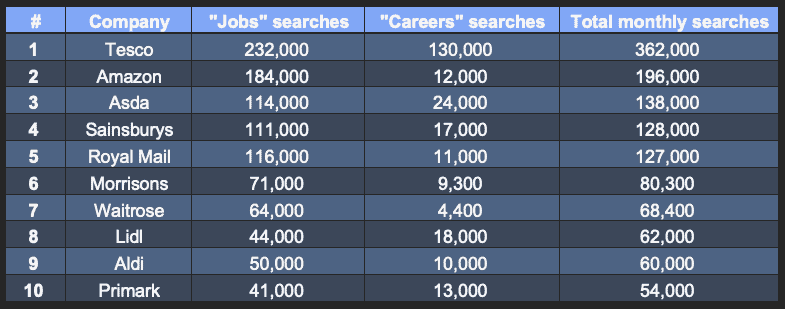Tesco, Amazon and Asda top the list of companies in the UK that people want to work for, with supermarkers dominating with seven of the top 10 Google searches for jobs and careers.
The study by marketing training hub School of Marketing analysed the top searches for jobs and careers on Google and found that Tesco came out as the most popular company, with the multinational supermarket seeing more than 362,000 searches a month on average for openings.
There are, on average, 232,000 searches a month for ‘Tesco jobs’ and 130,000 a month for ‘Tesco careers’. It’s by far the most popular company to work for at the moment, with more than 150,000 searches over second place Amazon.
Amazon in second place, still has more than 184,000 searches a month for ‘Amazon jobs’ and more than 12,000 monthly searches for ‘Amazon careers’, adding up to an average of 196,000 searches a month for Amazon opportunities from UK workers.
Coming in third place with more than 138,000 searches a month for openings is Asda. This is thanks to more than 114,000 searches for ‘Asda jobs’ and 24,000 searches monthly for ‘Asda careers’.
Sainsbury’s comes in the fourth position on the list, with 111,000 monthly searches for ‘Sainsbury’s jobs’ and 17,000 searches a month for ‘Sainsbury’s careers’, totalling 128,000 searches a month.
Royal Mail comes in fifth place as one of three entries in the top ten that aren’t supermarkets. On average, there are 116,000 searches a month for ‘Royal Mail jobs’ and 11,000 searches for ‘Royal Mail careers’ adding up to a total of 127,000.
The rest of the list is dominated by supermarkers, with only Primark making the list at number 10 as the only other non-supermarket on the list.

Commenting on the findings, Ritchie Mehta, CEO of School of Marketing, says: “It’s clear where the interest in the private sector job market lies now, and it’s in supermarkets. Additionally, some supermarkets are much more popular for job prospects than others.
“With major brands at the top of many people’s minds when they begin a job search, smaller businesses need to work harder to find and attract skilled employees. One extremely effectively way to do that is to take advantage of initiatives such as the Apprenticeship Levy scheme to bring in new staff or train current ones in digital and data-led programmes, with the vast majority of the training cost covered by the levy.”









